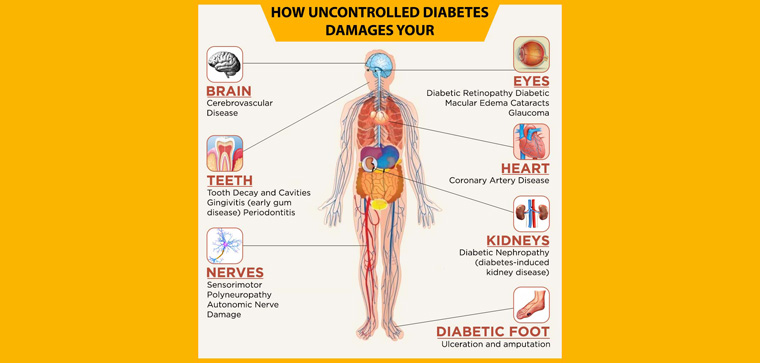Diabetes Complications Treatment
Reduce the Risk of Diabetes Complications
Managing diabetes is more than controlling blood glucose levels.
Reducing the risk of complications requires screening and using the right medication therapy for blood glucose, blood pressure, and cholesterol to protect the body from eye, feet, kidney, and cardiovascular complications.

Cardiovascular Complications in Diabetes
If you have diabetes or pre-diabetes you have an increased risk for heart disease. Diabetic heart disease can be coronary heart disease (CHD), heart failure, and diabetic cardiomyopathy
Diabetes by itself puts you at risk for heart disease. Other risk factors include
- Family history of heart disease
- Carrying extra weight around the waist
- Abnormal cholesterol levels
- High blood pressure
- Smoking
Some people who have diabetic heart disease have no signs or symptoms of heart disease. Others have some or all of the symptoms of heart disease.
Treatments include medications to treat heart damage or to lower your blood glucose (blood sugar), blood pressure, and cholesterol. If you are not already taking a low dose of aspirin every day, your doctor may suggest it. You also may need surgery or some other medical procedure. Lifestyle changes also help. These include a healthy diet, maintaining a healthy weight, being physically active, and quitting smoking.
Diabetes Complications in Nerves & Feet
Diabetes can cause damage to the nerves throughout the body when blood glucose and blood pressure are too high. This can lead to problems with digestion, erectile dysfunction, and many other functions. Among the most commonly affected areas are the extremities, in particular the feet. Nerve damage in these areas is called peripheral neuropathy, and can lead to pain, tingling, and loss of feeling. Loss of feeling is particularly important because it can allow injuries to go unnoticed, leading to serious infections and possible amputations. People with diabetes carry a risk of amputation that may be more than 25 times greater than that of people without diabetes. However, with comprehensive management, a large proportion of amputations related to diabetes can be prevented. Even when amputation takes place, the remaining leg and the person’s life can be saved by good follow-up care from a multidisciplinary foot team. People with diabetes should regularly examine their feet.
